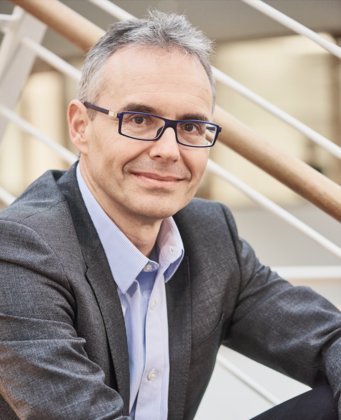Angel Rubio awarded membership of Berlin-Brandenburg Academy of Sciences
Angel Rubio, the director of the MPSD’s Theory Department, has been elected as a member of the Berlin-Brandenburg Academy of Sciences and Humanities (BBAW). In selecting him for membership, the Academy highlights his pioneering work to develop modern “theoretical spectroscopy” as well as the ambitious theoretical framework to describe light-matter interaction – Quantum Electrodynamical Density Functional Theory (QEDFT).

Rubio’s research focuses on the electronic and structural properties of advanced materials, nanostructures and molecular complexes. His work includes the development of theoretical tools to investigate the electronic response of materials and molecules to external electromagnetic fields. In November 2022, he was named as a Highly Cited Researcher whose papers rank in the top 1% by citations for this specific research field.
The membership award is an honor, says Rubio: “To be selected as a member of the Berlin-Brandenburg Academy of Sciences is a privilege and personal joy. It is a great and humble honor to see my name associated with the list of members of this academy who have marked history in the development of science in all its versions and in particular in quantum and materials physics.”
Angel Rubio is one of the founders of the European Theoretical Spectroscopy Facility and the originator of the widely used ab initio open-source project Octopus. He is a Fellow of the American Physical Society (APS), the American Association for the Advancement of Science (AAAS) and the European Academy of Sciences (EAS), as well as a Member of the Academia Europaea and a foreign associate member of the National Academy of Sciences. His honors include the 2018 Max Born Medal and Prize, the 2016 medal of the Spanish Royal Physical Society, the 2014 Premio Rey Jaime I for basic research, the 2006 DuPont Prize in nanotechnology, the 2005 Friedrich Wilhelm Bessel Research Award of the Humboldt Foundation, and two Advanced Grants by the European Research Council (2011 and 2016). In 2017, he became a Distinguished Research Scientist at the Flatiron Institute's Center for Computational Quantum Computing in the United States.
The Berlin-Brandenburg Academy of Sciences and Humanities, which was founded more than 300 years ago, aims to further the sciences as well as the dialogue between science and society. Since 1994, it has established more than 80 interdisciplinary working and study groups which investigate topics that are particularly significant in social and scientific terms. The Academy also issues advice on social and political issues in Germany and abroad.












